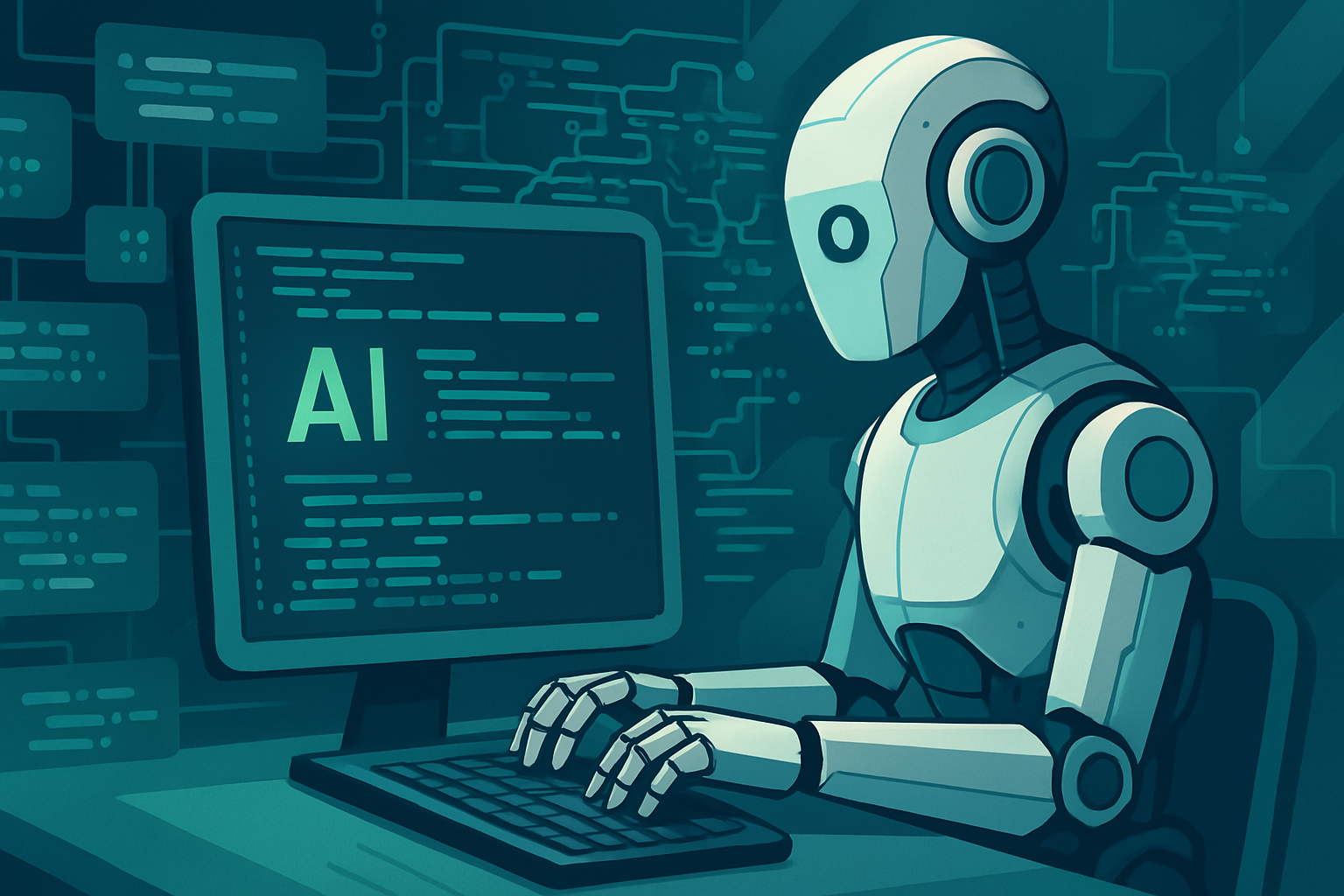Article 8: AI for Code Generation: Revolutionizing Software Development in 2025
Meta Title: AI Code Generation (2025): Tools, Benefits & Future of Development
Meta Description: Explore how AI is transforming software development with AI code generation tools. Learn about the benefits, top tools, and the future impact on developers in 2025.
Target Keywords: AI code generation, AI for developers, AI programming assistant, AI software development, best AI coding tools
From Prompts to Programs: How AI Code Generation is Revolutionizing Software Development in 2025
Software development has always been at the forefront of technological advancement. Now, Artificial Intelligence (AI) is ushering in another paradigm shift with the rise of AI code generation tools. These sophisticated assistants can understand natural language prompts, translate them into functional code across various programming languages, suggest completions, identify bugs, and even write documentation. In 2025, AI code generators are not just novelties; they are becoming integral to the developer workflow, promising increased productivity, faster development cycles, and new levels of coding accessibility.

What Can AI Code Generation Tools Do?
AI-powered coding assistants offer a wide range of capabilities:
- Code Generation from Natural Language: Developers can describe the desired functionality in plain English (or other languages), and the AI will attempt to generate the corresponding code snippets or even entire functions.
- Code Completion & Suggestion: Similar to autocomplete in text editors, but far more advanced. AI tools can predict and suggest the next lines of code, entire code blocks, or relevant API calls based on the context of the existing code.
- Bug Detection & Fixing: AI can analyze code to identify potential bugs, security vulnerabilities, or performance bottlenecks and often suggest fixes.
- Code Translation & Refactoring: These tools can help translate code from one programming language to another or assist in refactoring existing code for better readability, performance, or maintainability.
- Documentation Generation: AI can automatically generate comments, explanations, and even full documentation for code, saving developers significant time.
- Unit Test Generation: Some AI tools can assist in writing unit tests for code, helping to ensure its reliability and correctness.
- Learning & Explanation: Developers can ask AI coding tools to explain complex code snippets or programming concepts.
Leading AI Code Generation Tools in 2025
Several powerful AI coding assistants are prominent in the development landscape:
- GitHub Copilot: Powered by OpenAI Codex (a descendant of GPT models), GitHub Copilot integrates directly into popular IDEs like VS Code. It offers intelligent code suggestions and completions as you type.
- Amazon CodeWhisperer: Amazon’s AI coding companion provides real-time code recommendations in IDEs and also includes reference tracking to help with code attribution and security scanning.
- Tabnine: An AI assistant that supports a wide range of languages and IDEs, focusing on providing context-aware code completions. It offers both cloud-based and on-premise options.
- Replit Ghostwriter: Integrated into the Replit online IDE, Ghostwriter offers features like code generation, explanation, and transformation.
- Google’s AI for Developers (e.g., within Android Studio, Vertex AI Codey APIs): Google is increasingly embedding AI coding assistance into its developer tools and cloud platform, leveraging its advanced AI models.
Benefits for Developers and Development Teams
- Increased Productivity: AI can significantly speed up the coding process by automating repetitive tasks and generating boilerplate code.
- Faster Development Cycles: Quicker coding and debugging can lead to faster project completion.
- Improved Code Quality: AI can help catch errors early and suggest best practices, potentially leading to more robust and secure code.
- Reduced Learning Curve: AI can assist junior developers by explaining code and providing examples, helping them learn new languages or frameworks more quickly.
- Enhanced Focus: By handling mundane coding tasks, AI allows developers to concentrate on more complex problem-solving and architectural design.
- Accessibility: AI can make coding more accessible to individuals who may not have extensive traditional programming training.
Challenges and Considerations
- Accuracy and Reliability: AI-generated code is not always perfect and can sometimes contain subtle bugs or inefficiencies. Thorough review and testing by human developers are essential.
- Understanding vs. Memorization: There’s a concern that over-reliance on AI for code generation might hinder a developer’s deeper understanding of underlying programming concepts.
- Security Implications: AI-generated code could inadvertently introduce security vulnerabilities if not carefully vetted. Additionally, the training data for AI models could potentially include insecure code patterns.
- Copyright and Licensing: The ownership and licensing of AI-generated code can be complex, especially if the AI was trained on open-source code with various licenses.
- Integration with Existing Workflows: Effectively integrating AI coding tools into established development practices and team workflows requires careful planning.
The Future of AI in Software Development
AI code generation is poised to become even more sophisticated. We can anticipate AI tools that can understand higher-level architectural requirements, participate more actively in the design process, and offer even more proactive assistance in debugging and optimization.
The role of the developer is likely to evolve. Instead of writing every line of code, developers may spend more time defining problems, guiding AI assistants, reviewing and refining AI-generated code, and focusing on the creative and strategic aspects of software engineering.
AI code generation is not about replacing developers but empowering them. It’s a powerful new tool in the developer’s arsenal, set to make software creation faster, more efficient, and potentially more innovative than ever before.
Leave a Reply